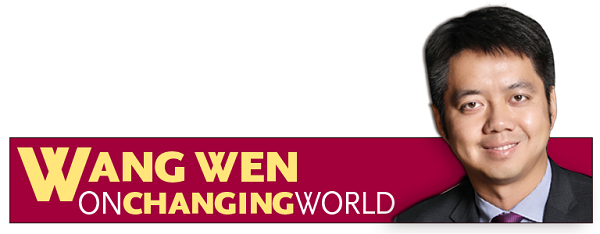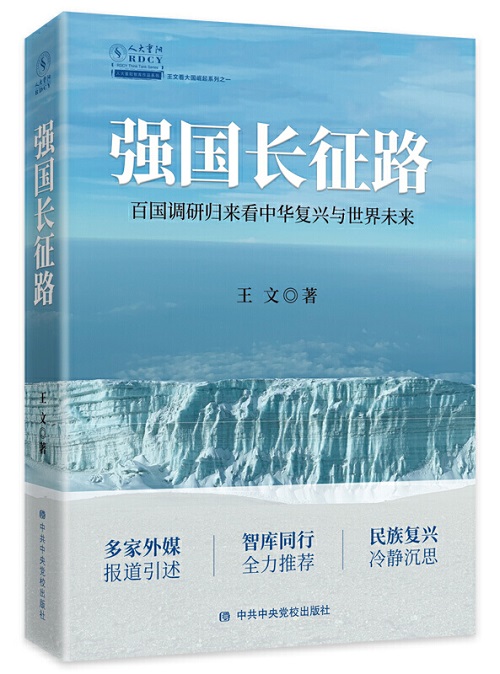Commentaries
Your Present Location: Teacher_Home> Wang Wen> CommentariesWang Wen: What’s behind the fear to criticize the US?
By Wang Wen Source: Global Times Published: 2019-12-3

If you have never been to northeastern Guangzhou, capital city of South China's Guangdong Province, you may have not heard of the Imperial Springs hotel that has a conference center where the Imperial Springs International Forum was held on Sunday and Monday.
I have been invited to the annual event thrice. This year, participants included 30 former heads of state and government and leaders of international organizations, together with 40 scholars and business leaders as well as over 300 well-known participants.
The theme of this year's forum was "Multilateralism and Sustainable Development." All participants believe multilateralism is the future of mankind and people should have mutual trust, cooperate and open up to one another. I didn't doubt the sincerity and concern of participants who are globalists, as the international community is unprecedentedly anxious due to the prevailing environment of unilateralism and protectionism that threaten multilateralism.
But we need more pragmatic steps than mere lip service.
In the past year or two, I have participated in over 10 multilateralism-themed international forums, where I got fed up with the lip service that couldn't get the point.
Therefore, at the Sunday afternoon breakout session focusing on United Nations 2030 Agenda for Sustainable Development and impetus for new era of globalization, I was outspoken in my keynote statement.

I asked, "Why does no one dare to criticize the US, which is the main country engaging in unilateralism? Why is the international community at its wits' end after the US has pulled itself out of various treaties and organizations? Why doesn't the international community jointly rein in the US international power?"
My three questions surprised many of those present and added a tinge of excitement to the tedious breakout session. Then, I continued, "The 2030 agenda that sets out to achieve the 17 goals including 'no poverty' and 'zero hunger' needs clear and feasible mechanism rather than just empty talk."
First, there should be an incentive mechanism. The international community should award the countries that have made progress in achieving the 17 sustainable development goals. For instance, China has been leading the world in poverty alleviation, but no Chinese scholar or research fellow engaged in working on the goal was awarded the Nobel Prize in Economic Sciences this year, which was instead shared by two economists with MIT and one with Harvard "for their experimental approach to alleviating global poverty."
Second, for the countries that have done damage to the 2030 agenda, the international community should set up mechanisms to hold them to account. For example, after the 2008 global financial crisis broke out in the US, it led to the bankruptcy of millions of people worldwide; the US policy has made millions of Syrian refugees go into exile; "Leaked Pentagon files obtained by the Guardian contain details of more than 100,000 people killed in Iraq following the US-led invasion," reported The Guardian in October 2010; US troops have caused heavy casualties in Afghanistan… Why is there nobody that holds the US to account? When I made these points at the forum, former Afghan president Hamid Karzai, who sat opposite me, expressed his gratitude.
Third, there should be mechanisms for penalizing violators of the goals. The international community should have punitive measures in place for Western media outlets that file inaccurate reports or even create rumors about the progress of the 2030 Agenda. Most Western media outlets we read are responsible for their negative reports on China. I am worried that when future historians look at Western media's reports today, they will find that they ignored and misreported the greatest historical event in the early 21st century - China's development.
Many of my friends praised the view. After the forum, a senior UN official told me privately that I had said what he dare not say for years. A young scholar said my speech was uplifting. Many listeners exchanged business cards with me.
I appreciate these friends' approval. But in the delicate atmosphere of international politics, I seem to be the truth-telling boy in the tale, The Emperor's New Clothes. In fact, it is difficult to tell the truth.
In the US, there are many lovely people and innovations that are worth learning. Its democratic system was once respected. But the US hegemony is like a Sword of Damocles for all globalists. They do not praise the US hegemony, but they are afraid of criticizing it, because if they do so, it may monitor them, sanction them and even destroy them. Is this the international version of George Orwell's dystopian novel 1984?
If there are no moves from the international community to set limits on the US unilateralism, I am afraid all efforts to defend multilateralism will be in vain.
The author is professor and executive dean of Chongyang Institute for Financial Studies, at Renmin University of China and executive director of China-US People-to-People Exchange Research Center. His new book Great Power's Long March Road was launched recently.
























































































 京公网安备 11010802037854号
京公网安备 11010802037854号





